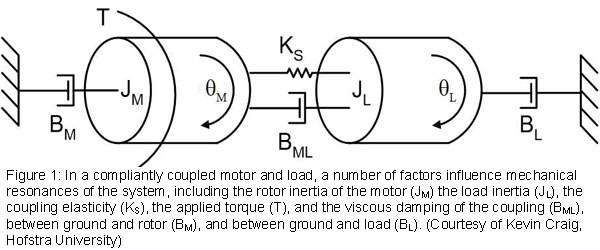Difference between revisions of "Inertia mismatch"
| [checked revision] | [checked revision] |
| Line 3: | Line 3: | ||
It is generally to avoid higher than 10:1 inertia mismatch, meaning that load inertia should be no more than 10 times the motor's inertia. However, for good [[servo stiffness]] it is recommended to keep mismatch below 5:1 or even 3:1. The lower the better. | It is generally to avoid higher than 10:1 inertia mismatch, meaning that load inertia should be no more than 10 times the motor's inertia. However, for good [[servo stiffness]] it is recommended to keep mismatch below 5:1 or even 3:1. The lower the better. | ||
| + | High inertia mismatch typically causes difficulties achieving good [[servo stiffness]] without getting oscillations/overshooting or instability. | ||
==Caulculating inertias== | ==Caulculating inertias== | ||
===Motor=== | ===Motor=== | ||
Revision as of 18:34, 28 July 2016
In servo motor system, inertia mismatch means the difference of physical inertia between the motor and the load. This is important because any flexibility of motor shaft coupling to load forms an oscillator that has resonance frequency that depends on the inertia mismatch. The higher the load inertia is compared to motor inertia, the lower the resonant frequency comes.It is generally to avoid higher than 10:1 inertia mismatch, meaning that load inertia should be no more than 10 times the motor's inertia. However, for good servo stiffness it is recommended to keep mismatch below 5:1 or even 3:1. The lower the better.
High inertia mismatch typically causes difficulties achieving good servo stiffness without getting oscillations/overshooting or instability.
Contents
Caulculating inertias
Motor
To obtain motor inertia, refer to your motor data sheet.
Load
Load inertia depends on the size and shape of the load. Also in lead screw mechanics, the inertia will be the sum of rotary inertia and reflected linear inertia. For various calculation equations, see the links below:
- http://www.engr.sjsu.edu/bjfurman/courses/ME106/ME106pdf/inertiaformulas.pdf
- http://www.motioncontrolonline.org/content-detail.cfm/Motion-Control-Technical-Features/Understanding-the-Mysteries-of-Inertia-Mismatch/content_id/404
Countermeasures
Several methods exist to counter the effects of high inertia load.
Reduction
Use reducer, such as low backlash timing belt to reduce the reflected inertia to motor. Reduction reduces load inertia by power of two compared to reduction ratio. I.e. if reduction is 1:2 then reflected load inertia reduces by factor of 4.
Stiffer coupling
As the coupling between the motor and load is part of the oscillating system, using higher stiffness coupler will make improvement.
Servo tuning
Try following tuning ideas:
- Reduce torque control bandwidth Torque bandwidth limitTBW, note this also requires retuning of velocity and position control gains
- Use notch filter that matches the resonance peak frequency (available in IONI Pro and similar drives)
